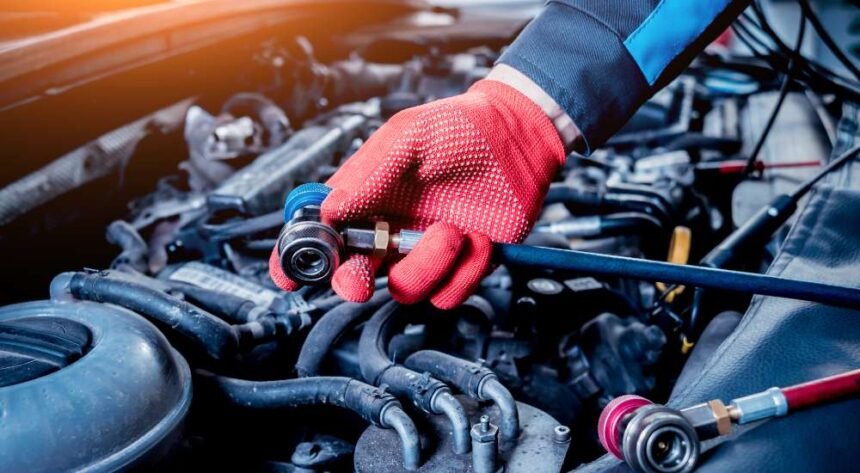There’s nothing quite as frustrating as a car air conditioner that stops working on a hot day. Whether it’s blowing warm air or not turning on at all, your vehicle’s AC system plays a huge role in your comfort and safety on the road especially during summer months.
But when your car’s air conditioning starts acting up, the big question arises: should you repair it or replace it entirely? Knowing when to fix versus when to replace your car’s AC system can save you both time and money in the long run.
In this detailed guide, we’ll explain how your car’s AC system works, the common signs it needs attention, and when a simple repair will do versus when replacement is the smarter investment. We’ll also share why choosing a trusted shop like Blue Ridge Automotive can make all the difference in keeping your car cool and efficient.
How Your Car’s AC System Works
Before deciding between repair and replacement, it’s helpful to understand the basics of how your car’s AC system functions.
Your car’s air conditioning works through a closed-loop refrigeration system that circulates refrigerant to absorb heat from the cabin and release it outside. The major components include:
- Compressor: The heart of the system that pressurizes refrigerant and moves it through the system.
- Condenser: Removes heat from the refrigerant as it flows through coils, turning gas into liquid.
- Evaporator: Located inside your dashboard, it cools the air that’s blown into the cabin.
- Expansion valve or orifice tube: Controls the flow of refrigerant into the evaporator.
- Refrigerant lines and seals: Carry refrigerant between components.
When everything is working properly, the result is a steady flow of cool, comfortable air. But over time, leaks, worn parts, or electrical issues can cause the system to fail.
Common Signs Your Car’s AC Needs Repair
Before jumping into major replacements, it’s worth checking whether your system might only need a simple fix. Here are the most common symptoms of AC trouble:
1. Warm or Weak Airflow
If your AC is blowing warm or slightly cool air instead of cold, your refrigerant levels may be low often due to a small leak. Other possible causes include a faulty compressor clutch or a clogged expansion valve.
2. Strange Noises When the AC Turns On
Clicking, rattling, or grinding noises when you start the AC usually signal worn or failing components, such as the compressor or fan motor. Ignoring these noises can lead to bigger problems down the line.
3. Bad Odors from the Vents
A musty or sour smell can indicate mold or mildew buildup inside the evaporator core. This is not only unpleasant but can also affect air quality inside your car.
4. Leaking Fluid Under the Car
Refrigerant leaks are a major sign your AC system needs attention. While refrigerant itself evaporates quickly, oily residue beneath your car may indicate a leak point.
5. AC Turns On and Off Intermittently
If your air conditioning cycles on and off too frequently, it could be caused by electrical issues, a failing pressure switch, or a bad relay.
6. Unusual Humidity or Fog Inside the Cabin
If your windows fog up or your car feels unusually humid, your AC’s dehumidification process may not be working efficiently due to a failing evaporator or moisture in the refrigerant lines.
When a Repair Is the Best Option
Not every AC issue requires a full replacement. In many cases, a well-done repair can restore comfort quickly and affordably.
Minor Refrigerant Leaks
Small leaks are among the most common AC problems and are relatively inexpensive to fix. A technician can locate the leak using UV dye or electronic detection and reseal it, then recharge your system with refrigerant.
Faulty Compressor Clutch
Sometimes the compressor itself is fine, it’s just the clutch that’s worn out. Replacing the clutch instead of the entire compressor can save significant costs.
Blown Fuse or Electrical Fault
AC problems are often electrical. A blown fuse, faulty relay, or damaged wiring may prevent the compressor or fans from running. Replacing these small components is quick and inexpensive.
Dirty Condenser or Cabin Filter
Dust, leaves, or road grime can block airflow through your condenser or cabin filter. Cleaning or replacing these parts can restore cooling performance instantly.
If your AC system is newer, well-maintained, and the core components are still in good condition, repair is typically the smarter and more budget-friendly choice.
When Replacement Is the Smarter Move
In some situations, it makes more sense to replace key components or even the entire AC system instead of spending repeatedly on small fixes.
Major Compressor Failure
The compressor is one of the most expensive parts of the AC system. If it fails completely or contaminates the system with debris, replacement is usually the only safe and long-term solution.
Repeated Refrigerant Leaks
If you’ve fixed the same leak multiple times or your system keeps losing refrigerant quickly, it might indicate deeper damage to the hoses, condenser, or evaporator. Replacing the damaged parts (or the full system) can prevent recurring costs.
System Contamination
When moisture or debris enters the system often after a compressor failure it can clog valves and reduce efficiency. Cleaning and replacing affected components can restore reliability.
Outdated AC Systems
Older vehicles may still use R-12 or other obsolete refrigerants that are costly or difficult to find. In such cases, replacing or converting the system to use modern R-134a or R-1234yf refrigerant is a practical upgrade.
The Repair Process: What to Expect at the Shop
When you bring your car to Blue Ridge Automotive, here’s what you can typically expect during an AC service appointment:
1. Diagnostic Testing
Technicians use pressure gauges and electronic leak detectors to evaluate system performance, identify leaks, and check electrical components.
2. Visual Inspection
They’ll inspect hoses, belts, and connections for signs of wear, cracks, or leaks.
3. Refrigerant Recharge
If your system is low on refrigerant, they’ll recharge it to the proper level using manufacturer-approved methods.
4. Component Replacement
If needed, worn parts such as the compressor, condenser, or expansion valve are replaced using quality OEM or equivalent components.
5. System Cleaning and Leak Testing
The entire system is flushed and tested to ensure it’s free of contaminants and performing efficiently.
Why Professional AC Service Matters
Your car’s AC system is complex and working with refrigerants requires precision and safety. DIY repairs can lead to leaks, contamination, or even damage to other systems in your car.
Here’s why choosing professionals like Blue Ridge Automotive is important:
- Expert Diagnosis: Experienced technicians identify the root cause quickly.
- Proper Equipment: Professional shops use certified refrigerant recovery and testing tools.
- Long-Term Solutions: They ensure every component works harmoniously to prevent repeat issues.
- Environmental Responsibility: Certified shops handle refrigerants safely, minimizing environmental impact.
Frequently Asked Questions (FAQs)
Q: How often should I have my car’s AC system serviced?
A: Ideally, you should have your AC system inspected once a year to check refrigerant levels, leaks, and performance.
Q: Why is my car’s AC blowing warm air?
A: Common reasons include low refrigerant, a faulty compressor, or a blocked condenser. A professional diagnosis will pinpoint the exact issue.
Q: How long does car AC repair take?
A: Minor repairs can take an hour or two, while major replacements may require half a day or more, depending on the parts involved.
Q: Is it safe to drive with a broken AC?
A: While it won’t affect drivability, a malfunctioning AC can lead to overheating in extreme weather or foggy windows that reduce visibility.
Q: What’s the average cost of AC repair or replacement?
A: Repairs can range from $150–$500 for minor issues, while full replacements may cost $1,000–$2,500 depending on the make and model of your vehicle.
Conclusion
When your car’s air conditioning starts failing, knowing when to fix versus when to replace can make a major difference in comfort, cost, and reliability. Minor issues like small leaks or dirty filters are often quick fixes, but if your system keeps breaking down or the compressor fails, replacement may be the best long-term investment.
Whichever the case, always trust a professional repair shop like Blue Ridge Automotive. Their team’s experience, honesty, and attention to detail ensure your AC system performs efficiently keeping you cool and comfortable on every drive.
About Blue Ridge Automotive
Blue Ridge Automotive is a trusted name in reliable auto care, providing expert maintenance and repairs for all makes and models. From brake and engine service to complete AC repair and replacement, their certified technicians are dedicated to ensuring your vehicle performs at its best.
Known for their transparency, professionalism, and commitment to customer satisfaction, Blue Ridge Automotive takes the stress out of auto repair. Whether your car’s air conditioner just needs a quick fix or a complete system overhaul, their team delivers quality results at fair prices.
Visit Blue Ridge Automotive to schedule an appointment and keep your car cool, comfortable, and road-ready all year long.
Business Name: Blue Ridge Automotive
Address: 3190 Roswell Rd NW Atlanta, GA 30305
Phone number: 404-266-1699














